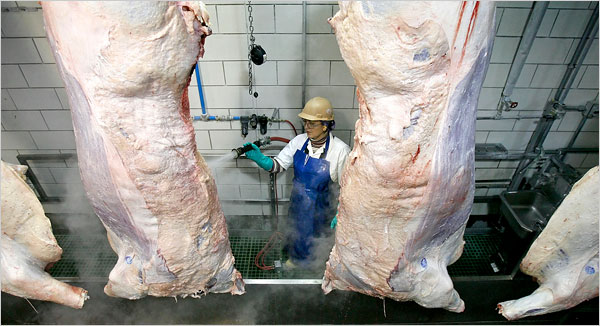Livestock carcass washing rules remain a Canada-EU irritant despite CETA

iPolitics | 11 May 2016
Livestock carcass washing rules remain a Canada-EU irritant despite CETA
by Kelsey Johnson
A dispute over the way Canadian slaughter plants wash beef and pork carcasses could prevent Canadian beef and pork producers from taking advantage of new market access granted under the pending Canada-Europe trade agreement, industry says.
The European Union has yet to approve two key antimicrobial solutions used in slaughter facilities to wash beef and pork carcasses: citric acid and peroxyacetic acid (similar to vinegar).
These approvals, Canada’s beef industry says, are essential for exporting beef and pork cuts to the European market.
“Until these treatments are approved, the signal that we have from the cattle side, from Cargill and JBS, is that they will not be interested in accessing the European market,” says John Masswohl, director of government relations for the Canadian Cattlemen’s Association.
“And, as long as Cargill and JBS remain uninterested in the European market, there’s not really much incentive for cattle producers to increase their production of cattle that are eligible for Europe.”
Under the bilateral Comprehensive Economic and Trade Agreement (CETA), Canadian ranchers will see their tariff rate quotas increase to 80,000 tonnes of pork and 65,000 tonnes of beef phased in over three to seven years. For their part, European ranchers will receive duty-free access for their beef and pork.
But Masswohl warns filling those quotas could be “difficult” if the dispute over antimicrobial washes isn’t resolved.
Canadian slaughter plants wash carcasses with recycled hot water that is treated with three different solutions: lactic acid, citric acid, and peroxyacetic acid. In European slaughter plants, new water is used for every carcass wash.
When Canada and the European Union reached an agreement-in-principle in 2013, the two parties officially agreed to discuss their respective carcass wash methods further.
The letter said both parties would set a high priority on determining equivalency around meat inspection, including antibacterial protocols, within a year, Masswohl says.
Canada has already approved the European Union method – paving the way for unfettered, tariff-free Canadian market access for European beef and pork.
But the same approval has not been granted by the European Union around antibacterial washes, with little explanation.
EU officials have approved the use of recycled water and lactic acid, but have not granted equivalency for citric acid and peroxyacetic acid.
“We’ve got two out of four. We’ve got two more to go,” Masswohl says.
“We are not asking Europe to do anything unsafe. We know it’s incumbent upon us to demonstrate to them that what we do is safe and we’re in the process of doing that,” Masswohl explains.
“But, by the same token, we expect that they will not be throwing roadblocks in the way.”
Those roadblocks, he says, include not being clear about the necessary paperwork and how many equivalency applications need to be submitted to European officials for consideration.
Then there’s the worrisome perception some European officials have about how Canada’s slaughter plants operate, Masswohl says.
“They seem to have a perception that our procedures for washing are corrective in nature. That they’re meant to cover up unhygienic practices,” he explains. “If you’ve ever been to a Canadian packing facility you know that that could not be more incorrect.
“And, in fact, when we bring European regulators to Canadian packing facilities they are amazed by how hygienic and clean they are compared to what they’re used to back in their countries,” Masswohl says.
The Canadian Cattlemen’s Association isn’t the only group concerned about the ongoing disagreement over carcass washing. The dispute is also on Agriculture Minister Lawrence MacAulay’s radar.
In an interview with iPolitics, MacAulay said he’s raised the issue with his European counterpart, Phil Hogan, at the recent OECD and G7 agriculture ministers meetings.
“I can’t give you an answer about what the EU will do,” MacAulay said. “But they’re certainly aware that we’re not pleased about how they’re handling this.”
“They did ask for information and we’re providing the information so hopefully that will do it,” the minister said, noting Agriculture Canada and EU officials are in ongoing discussions about the carcass wash.
“Hopefully we’ll get this issue resolved before CETA is ratified,” MacAulay added. Federal Trade Minister Chrystia Freeland has said she expects CETA could be ratified as early as 2017.
Asked whether he felt the antimicrobial issue would be resolved before CETA comes into force, Masswohl says it’s unlikely.
“It would be really ideal…if we could sort this out before the 2017 calving season, but that seems like an improbable timeline.”





